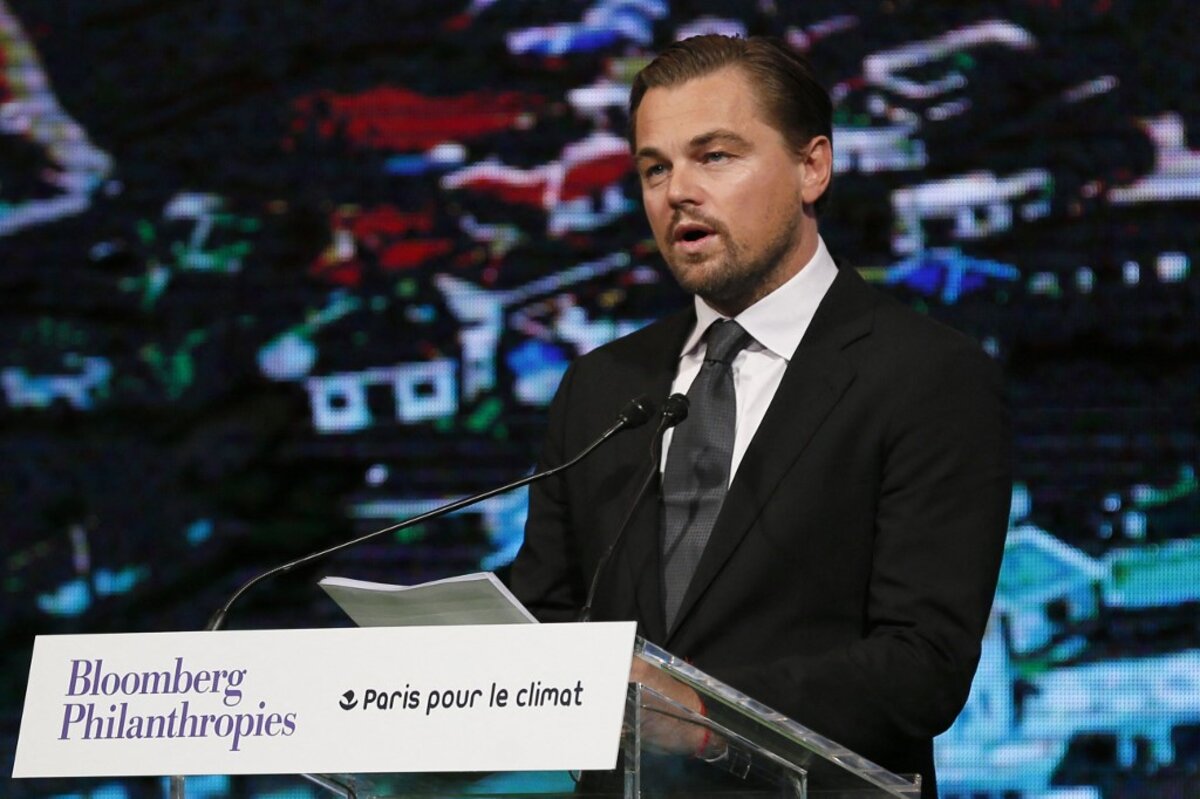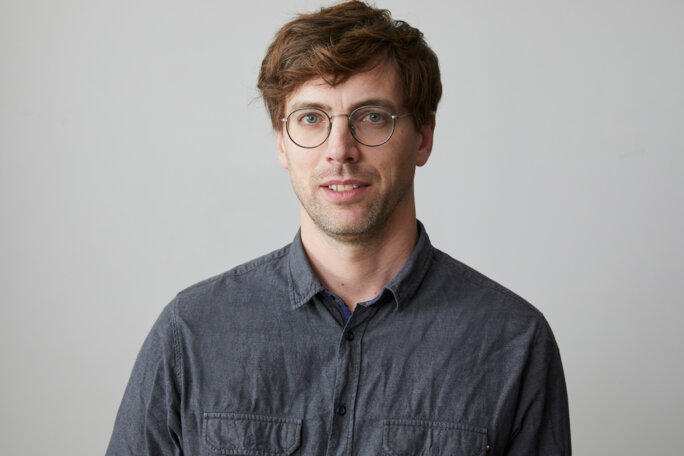This week sees the publication of a book by French academic Édouard Morena which traces the way in which wealthy elites have become influential figures in climate policies since the start of the 2000s.
According to Édouard Morena, whose book 'Fin du monde et petits fours' ('The end of the world and appetisers') is published by La Découverte, this climate elite includes figures such as Amazon founder Jeff Bezos and actor Leonardo DiCaprio, as well as some scientists and leading figures on the climate change world stage. The author, a senior lecturer at the University of London Institute in Paris, says that the ultra-rich relentlessly promote “green capitalism, a tailored political project and one which guarantees their class interests in an overheating world”.
Édouard Morena describes how the ultra-rich have built networks of philanthropic foundations, non-governmental organisations and consultancy firms that have helped impose the notion that companies and private investors are the only legitimate proponents of environmental transition in the face of climate chaos. The aim of this project is to perpetuate capitalism, which has been going through a crisis, and to silence any idea of a socially-just environmental transition.
Below is Mediapart's interview with the academic.

Enlargement : Illustration 1

Mediapart: In the context of the movement against pension reform, there's been a lot of talk about billionaires and their obscene fortunes who contribute very little to funding our social protection system. What we forget is that the wealth of these ultra-rich is also destroying the climate.
Édouard Morena: Last summer, the controversy over the trips in private jets made by some of the ultra-rich such as [luxury goods boss] Bernard Arnault in the middle of a heatwave highlighted the unsustainable lifestyles of the better-off.
This is an emerging area of research, such as the work of Lucas Chancel, from the World Inequality Lab, which shows that the richest 1% of the world produce more greenhouse gases than a half of the poorest people on the planet.
But the ultra-rich, the people who own financial assets, are also figures who direct the climate debate.
Indeed, their huge fortunes are not left under their mattresses. They're exposed to the climate crisis, through their investments in energy infrastructure and their properties on the American coastline that are threatened by extreme climate events. So there's a risk that their assets lose value, something which could also occur under more restrictive public policies on climate.
The ultra-rich thus have a 'climate class consciousness', a shared view of the climate crisis that in some respects pushes them to act like climate 'activists', to protect their private interests by employing strategies to influence the current climate debate.
Mediapart: Who exactly are the members of this 'climate jet-set' who lobby for a capitalist but de-carbonised society?
Édouard Morena: They include billionaire philanthropists such as Michael Bloomberg and even, in a sense, Jeff Bezos, founder of Amazon and the Bezos Earth Fund.
I'm also thinking of figures from the scientific world such as the Swede Johan Rockström, of celebrities such as Leonardo DiCaprio and figures from the climate world such as Christiana Figueres, ex-executive secretary of the UN Framework Convention on Climate Change, and the former vice-president of the United States Al Gore.

Enlargement : Illustration 2

There are also more discreet players who perform a supporting role to these figures, such as communications experts. The well-known consultancy firm McKinsey is very present around this climate 'jet-set' and helps to normalise the green capitalism message.
These are the people that one routinely sees at the COP [climate] meetings or at the World Economic Forum at Davos. These big gatherings reinforce the feeling that everyone belongs to the same 'climate heroes' community and that helps legitimise these figures.
Mediapart: What vision of transition is it that the ultra-rich are promoting?
Édouard Morena: They are campaigning for a move from fossil fuel capitalism to green capitalism, by highlighting technical solutions centred on technologies that are easily deployed on a small scale, such as solar or wind.
It should be remembered that Silicon Valley didn't make profits by inventing computers but instead by marketing the concept of the personal computer and the global network.
It's a particular concept of innovation where at the start you inject little capital but where you can also make lots of money. When it comes to transition it will be more of the same, as it's better for them to invest in intelligent and linked up networks of solar and wind farms rather than in nuclear, which is an industry which needs vast amounts of capital and which is highly regulated by the state.
They have a neo-liberal vision of transition in which the state's role is to guarantee their investments, to favour the deployment of private actors in transition and, above all, not construct a renewable energy public service.
Mediapart: You explain in your book how a vanguard of wealthy elites came together at the start of the 2000s to shape the climate debate.
Édouard Morena: That decade was a turning point, a time when the climate issue was put on the agenda. It was in 2006 that 'An Inconvenient Truth', the successful documentary by Al Gore that praised the merits of solar panels and hybrid cars, came out – a particular 'green growth' vision of the world in the face of the climate crisis.
It was also during this period that the European carbon market emerged (2005) and the start of 'green finance'. Finally, during this period the 'clean tech' sector grew in power in California after the internet stock market bubble burst. Silicon Valley spotted in these 'green' technologies a way of relaunching itself and of finding new investment opportunities.
This coalition of private actors in the tech and finance sectors knows that it needs favourable public policies to promote its vision of environmental transition. That was how an entire network was formed in order for the COP15 climate meeting in Copenhagen in 2009 to result in an international agreement that aligned with their own private interests.
Mediapart: How did that manifest itself at COP15?
Édouard Morena: Fixing the long-term international objective of not exceeding more that 2°C of warming was seen as a success for the climate elites. Their obsession is to minimise the risks to guarantee their future profits. And setting a limit of + 2°C gives a certain long-term visibility to investors. It sends a signal: that the transition to low carbon is inevitable and that, from an investment point of view, the future of green capitalism is safe.
It was also during COP15 in Copenhagen that the McKinsey consultancy positioned itself as the intermediary of choice for countries in the South in order to shape their state policies around the concept of “green growth” and to convince them that private companies were the best placed to perform this transition.
However, this climate elite had underestimated the importance of public opinion. NGOs and the media interpreted this 2009 climate summit as a diplomatic failure.
After Copenhagen more emphasis was put on communication during the COP meetings. The priority was no longer really to regulate the factors involved in climate change and to produce onerous objectives for countries, but instead to make spectacular announcements which highlighted private figures, companies and philanthropic foundations as being the true engines of transition.
The countries themselves became almost secondary in the UN process. That was particularly noticeable during COP 26 in Glasgow.
Mediapart: You also describe how the perception of forests as carbon sinks that were marketable came to unite conservative elites and liberal tech elites.
Édouard Morena: Indeed, forests sequester carbon and this can be sold in the form of carbon credits on the international markets.
For the old conservative elites, who come from aristocratic families and great landowners, this mercenary view of nature allowed them to privatise still further the land they owned.

Enlargement : Illustration 3

Under the pretext of protecting lands to preserve the climate thanks to the carbon that they sequester, these ultra-rich expelled from their properties the peoples who had been living there.
For those from the tech and 'green finance' sectors, these carbon markets where the carbon credits from the forests were marketed were seen as a new financial tool, a source of profit. On top of that, digital giants such as Google and Amazon are in great need of the carbon offset that forests provide in order to meet their commitment to carbon neutrality, as their business model is impossible to de-carbonise entirely.
So we're seeing an alliance of convenience between conservatives and liberals, a union that in part took place under the aegis of Prince Charles, now King Charles III, who in 2007 launched a plan to preserve the tropical rainforest and universalised the idea of putting a price on the carbon trapped in our ecosystems. During the 'Panama Papers' scandal, incidentally, it was discovered that the heir to the throne had invested a lot in carbon offset schemes.
Mediapart: What relationship does this climate elite have with the climate movement?
Édouard Morena: You can clearly see an attempt on their part to assimilate the climate movement. When the economic forum at Davos invited Greta Thunberg in January 2020 it wasn't with the idea of curbing her message – which would be impossible anyway – but instead because her very presence helps legitimise this international summit.
Meanwhile, some messages from the climate movement can, to its own detriment, legitimise those put forward by the climate elites. The need for urgent action, something regularly raised by Greta Thunberg, is an opinion supported by the elites because it allows them to impose their capitalist vision of transition, and to point the finger at anyone critical of them as being responsible for the failure of that very transition.
It's the same with Extinction Rebellion, who have 'Follow the science' as a slogan and who cite the reports of the IPCC [editor's note, the Intergovernmental Panel on Climate Change]. Yet green capitalism presents itself simply as an economic manifestation of what the scientists are saying.
Above all, the climate elites' power resides in their ability to orchestrate episodes in which they highlight the fact there is a climate emergency by backing reports from the IPCC and the climate movement, then orchestrate periods in which low-carbon initiatives are highlighted, in which the private players appear as the only proponents of transition.
Mediapart: To pick up the expression used at the end of your book, do we have to “devour the rich” (a phrase first used by French philosopher Jean-Jacques Rousseau)?
Édouard Morena: One has to “devour the rich” in the sense that the latter are acting in their own class interests and not towards a fair transition. That raises a fundamental question: who should lead environmental transition? Public bodies and society-based organisations, or the rich from the tech sector?
Finally, at a time of strikes against the pension reforms, rising up against the ultra-rich is a way of coming together that goes beyond simply the climate movement. It can provide a political junction point between different struggles, such as fighting for a retirement age of 62 or the energy renovation of homes.
--------------------------------------------------------------------------------
- The original French version of this interview can be found here.
English version by Michael Streeter


